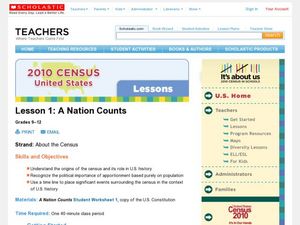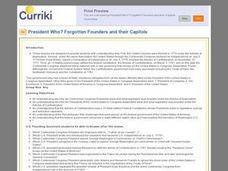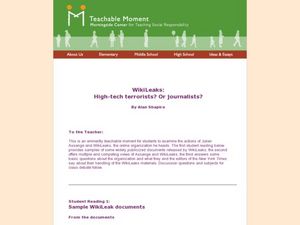Curated OER
Do Suspected Enemies Have Rights?
Students investigate the history of Japanese immigration. They complete an online Webquest, explore various websites, answer discussion questions, and locate and read newspaper articles about enemy compatants.
Curated OER
North Korea's Power Play
Young scholars research a number of websites to see how North Korea's leaders have shaped the country. They investigate Korea's ancient history and culture.
Curated OER
Factors Contributing To the U.S. Dominance of the Pacific Northwest
Students examine the painting Columbia by John Gast. They discuss the concept of Manifest Destiny and the role of different groups (miners, missionaries, fur trappers, farmers, etc.) in the Americanization of the West. In groups, they...
Curated OER
Black Soldiers in the Civil War
Students explain how a history of slavery distinguishes American society from other societies. They study posters and documents from different eras in our history which document the practice of slavery, and civil rights violations.
Curated OER
Changes in Draft Registration
Students evaluate the differences between the first draft registration and today's Selective Service form. They explore how changes in American society and culture influence changes in the draft system.
Curated OER
Reconstruction of Iraq: A Lesson of Historical Precedents
Students view a video clip about the reconstruction efforts in Iraq. They work together to compare and contrast the reconstruction plans after the Spanish-American War and World War II. They compare those results to the situation in Iraq.
Curated OER
Football at Carlisle Indian School: A Tool for Assimilation?
Middle schoolers become familiar with procedures for helping Indians assimilate in the 1800's. In this history lesson plan middle schoolers explore how football helped Indians to assimilate in a positive way. Middle schoolers...
Curated OER
The U. S. at War
High schoolers examine reasons for going to war. In this foreign policy lesson, students analyze the reasons the U.S. entered the the War of 1812, the Mexican War, the Spanish-American War, World War I, World War II, the Korean War, the...
Curated OER
Textbook Changes in Japan
Learners recognize that the Japanese government has made attempts to alter history textbooks to make it look like the military did not play a major role in the mass suicides during the American invasion in 1945. They review vocabulary,...
Curated OER
Wives and Mothers in WWII
Eighth graders explore the effect of World War II from a financial standpoint. In this World History activity, 8th graders review World War II through teacher lecture, reading and viewing pictures and cartoons, then discuss the hardships...
Curated OER
The Battle of the Bulge
Learners research the events and results of the Battle of the Bulge during World War II. As a class, they discuss the role of the military in the entire European theater and write a paper describing the situations and conditions the...
Curated OER
A Nation Counts
High schoolers explore the functions of the U.S. Census. In this civics lesson plan, students understand the origins of the census and its role in U.S. history, recognize the political importance of apportionment based purely on...
Curated OER
Opposing Views on the Vietnam War
Learners analyze the feelings of Americans regarding the Vietnam War. In this Vietnam War lesson, students collaborate to research Internet and print sources regarding the perspectives on U.S. involvement in the war....
Curated OER
Master Spy
Students explain that a code is a system of symbols, letters, words, or signals that are used instead of ordinary words and numbers to send messages or to store information. They practice deciphering a variety of secret codes used in...
Curated OER
President Who? Forgotten Founders and Their Capitols
Students explore the beginning of the United Colonies that were formed in 1774. For this history lesson, students discuss the Articles of Confederation and then answer questions about the events surrounding the development of the...
Curated OER
The Emancipation Proclamation
Students explore the historical importance of the Emancipation Proclamation. In this United States History lesson, students use the internet to research the specific events that were centered around the Emancipation Proclamation, then...
Curated OER
In Praise of Political Parties
Students research a political party and prepare a report about its history, philosophy, and the party's position regarding two major political issues. They complete a variety of additional creative activities regarding their party, as well.
Curated OER
WikiLeaks: High-tech terrorists? Or Journalists?
Young scholars investigate the credibility of WikiLeaks. In this history lesson, students read three WikiLeak articles, then answer questions that relate to each article.
Curated OER
1948 - Berlin Airlift
Young scholars examine a document from the Berlin Airlift in order to research his important event in World History.
Curated OER
Anti-Vietnam War Movement Lesson
Students examine reasons why many Americans opposed the Vietnam War. In this world history lesson, students view a Powerpoint of anti-war images and a timeline of events that led to the war. Students examine speeches made by John Kerry...
Curated OER
The Declaration of Independence (1776)
For this online interactive history worksheet, students respond to 10 short answer and essay questions about the Declaration of Independence.
National First Ladies' Library
Martha Goes To War!
High schoolers investigate how women went to war and the contributions that they have made in history. They conduct research using a variety of resources. The information is used in order to create a class presentation and answer some...
Curated OER
Defining moments: Framing the Problem
Students create a problem framing chart to examine the issues surrounding the decision to inter Japanese Americans during World War II. They respond to a set of questions using perspectives from different parties involved in the decision...
Curated OER
Kill the Indian, Save the Man!
Pupils investigate primary sources from Carlisle Indian School including letters and photographs. In this investigative instructional activity students answer questions about their research.

























